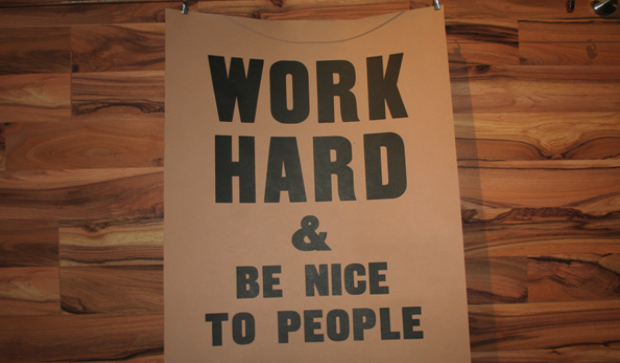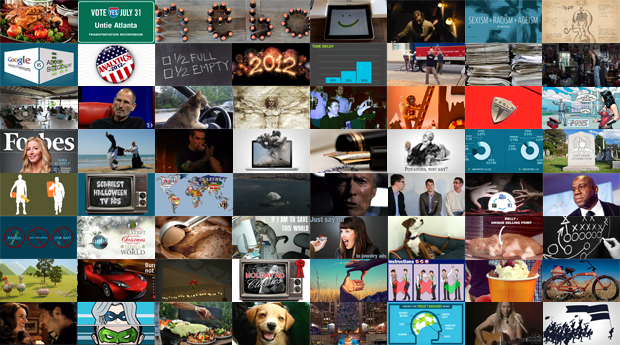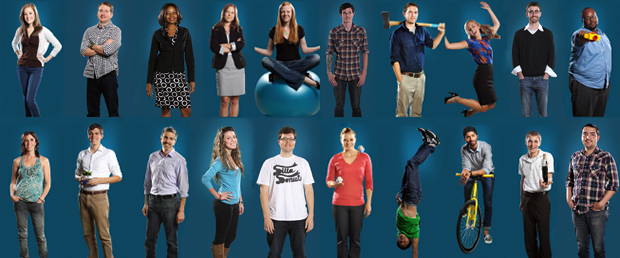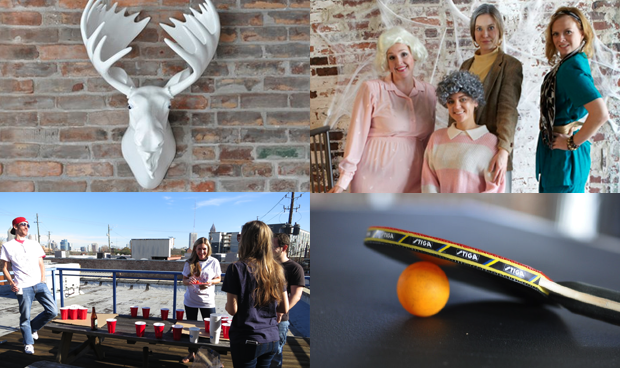Honesty, Loyalty, and Culture: Lessons from 2012

With each year that passes, we get a little wiser. Some of our principles and beliefs are reinforced. Others evolve as we learn and grow.
2012 was a tremendous year for us. We couldn’t have been more fortunate. Our team grew stronger. We added signature clients and launched exciting projects. We also learned a lot – both from our successes and failures.
Below are some of the biggest lessons we learned in the past year.

We’ve always been willing to fire clients to protect our team, integrity, and culture. But firing a client is hard, and it’s one of the most serious and impactful decisions an agency can make.
The bigger they are, and the more revenue they bring in, the harder it is to make that decision. However, you can’t put a price on company morale, integrity, or culture. So, in 2012, we fired our largest client because it was the right thing to do.
Sure, we were worried and made contingency plans from a financial perspective. And we worried about how the team would respond. But by firing this client, we reaped more than we ever could have imagined.
Our employees rallied behind us. Morale instantly improved. The team understood we valued them more than any client.


We’ve been very fortunate that we’ve historically had very little employee turnover. However, in the first four months of 2012 we lost a number of employees. Frankly, it was shocking. It rattled the entire team. It was especially unsettling given how close the team was and given the fact that we were in a positive growth mode. We didn’t know why it was happening. Nothing stood out at first glance.
Maybe this was a simple regression to the mean. Maybe it was just a series of coincidences. Regardless, we had two choices: we could put our heads in the sand and hope it was an anomaly, or we could tackle the problem head on. We chose to be proactive.
The first step was to be completely honest with the team about each departure and the reasons behind them. Then, we invited honest feedback from the departing employees as well as those that remained.
I do think part of the reason for people leaving was the regression to the mean and simple coincidence as I mentioned before, but that’s not to say there weren’t things we needed to change.
We needed to make work more fun and impactful, provide better paths for employee growth, and unfortunately, we needed to realize that some of the employees that brought us to this point weren’t necessarily suited to take us where we’re going.
We needed to make changes, and we did. Since April, we’ve only had one voluntary departure. Honesty matters – even if it’s not easy to say or hear.

Producing quality content is hard – very hard. It’s difficult enough to be a one hit wonder, but to consistently create content that is truly worth consuming is a herculean task. Comedians like Jon Stewart or Stephen Colbert who are spot on every night, every week, every month, year after year are God-like in my view.
It’s easy to fall into routines – to fall into an assignment mentality. The content can quickly become formulaic. We sometimes describe this style of content as Pink Slime. No one wants to create it, or consume it, but if you’re not careful, you become a manufacturer of it before you know it.
So, we developed some quick guidelines to our content approach. First, it has to matter. Our content should either take a stand, promote thought leadership, highlight our culture, or be really, really funny.

In addition, we wanted to make it easier to kill content at all stages of the process. Ideally, we nix it earlier in the process, but sometimes you have to let things play out before you can see whether it comes together or not.
Regardless, the litmus test must be passed before publishing. If we wouldn’t read it, why would we expect others to? Our human-centered digital approach isn’t just for our clients or a message platform – it’s a core part of everything we do. So why would we subject others to content not worth consuming? It wouldn’t be very human-centered of us.

Humans aren’t cold-hearted, rational beings. Even if you think people are cold-hearted by nature, you can’t argue that we’re always rational. We have a hierarchy of needs so to speak, and we need to have food, shelter, water, security, etc., but we also want and need more.
Over the years Nebo has given a lot – in pro bono work and with “at” or “below cost” work for worthy causes. However, we didn’t always let the team know the details, as it felt a little insincere to promote the charitable things we do.
This year has been slightly different. We’re not going to brag about all of the charitable things we’ve done, but we did bring the team into the decision process on some of the projects and made a more pointed effort to educate everyone on what we’re doing and why.
Rationally, everyone wants the company to do well for the sake of job security and promotions, but what really gets people excited is doing great work that matters. One employee noted on his Facebook account that he was pumped about working on two worthy projects. That's exactly the kind of thing that tells us we're headed in the right direction.
Most of our work is for “for-profit” organizations, but having a healthy mix of charitable projects makes everyone feel a lot better about the work that they do and why they do it.

Companies expect employees to be loyal, but many times it's one-way expectation. They also expect employees to leave if they get a better salary offer. This tends to bring an unhealthy dynamic to the employee / employer relationship, and assumes loyalty is almost strictly financially based.
Studies show that salary isn’t the most effective reward or the key to loyalty. Everyone wants to be paid fairly, but there are many other things that matter. Factors like autonomy, doing work that matters, being able to see the impact of your labor, and having a good work environment tend to far outweigh salary considerations. That, of course, assumes fair pay, according to studies.
However, one often over-looked motivator is mutual loyalty. How many companies stand by their people when they’re down? Everyone goes through rough patches. Many times the standard sick days or vacation days don’t match the needs of an unexpected life event.

I’m not going to give examples or offer specific advice, but I will tell you that we’ve stood by our people many times when other organizations probably wouldn’t. And many of those employees have been with us for years and are invaluable to Nebo.
Once again, it’s the human-centered test, so to speak. It’s easier for us to bend or break the rules given we’re a 40 person agency, but standing by your people when they need it most isn’t just the smart business move, it’s the right thing to do.

As a company grows, it’s easy to slowly lose your culture. Some say that’s part of maturity. Some say that’s the price you pay for success. Some say culture doesn’t scale. We don’t believe that. We think culture is a competitive advantage and is the reason for our existence.
Whether it’s holding fast to our traditions, keeping new processes inline with our core philosophies, or doing things the seemingly hard way, protecting our culture is probably the most important thing we can do.
Each client has a project manager that they can call or email. We don’t believe in the support ticket model. How dehumanizing is filling out a form for help or assistance? That doesn’t pass the human-centered test at Nebo. Just call or email your project manager directly. This will never change.
As the team grows, it’d be easy to lump birthday celebrations into a monthly event, but they would lose their meaning. Celebrating individual birthdays may seem trivial to some, but they show we care about each person. We’re not just going through the “HR” motions.
Make food and drink part of bonding. Many would argue you have to keep a distance between work and life. Between management and the staff. Between the various hierarchical levels in the organization. We believe lunches, dinners, and the occasional drinks after work are often where the best ideas happen. Many of our blog post concepts and best client ideas were originated over food and drink among peers.

Don’t sell. Ever. Solve problems and manage the sales process, but don’t sell. I keep hearing from industry peers and competitors alike that we’ll change this approach when we grow up. They’re wrong. We won’t. And frankly, I feel sorry for them for not being able to see the bigger picture. I’m not going to go into all of our reasons this will never change, Alice already did a great job of explaining this. However, if you focus on solving problems versus selling, not only will you sell more, your staff’s respect for you will grow. That’s the foundation of building company culture.

Life is short. Work can be consuming. Clients can be demanding. However, for the most part, we control our own happiness levels. Part of maintaining a positive attitude and happy work environment is focusing on the positive things in our lives.
That’s why we celebrate everything. We hit our gong when sites launch. We celebrate the end of each workweek with Beer Fridays. We celebrate each employee’s birthday. We have Festival-0-Meats and Veg-o-Ramas. We’ll have donut eating contests and often have silly “tests of will” and competitions (see the ghost pepper video or spoiled milk smashing as examples). We played Kool & the Gang’s “Celebration” after a recent project win.
It’s not just that we like to have fun. We make our own happiness. In this fast paced, stressful industry, celebrating as a team is part of the glue that holds us together and helps make our agency more than an agency.

- The famous Nebo gong.
Conclusion
In 2012 we learned how important it is to stay true to the philosophies Nebo was built on. We witnessed first hand why putting people first is critical to our success as we continue to grow. It would be easy to power through with clients that pay us well but don't align with our core values, or to cut back on fun and expenses as our team gets larger, but Nebo has never done things the easy way.
We built the company because we wanted to do things differently. Now that we've enjoyed some success, now is not the time to abandon the M.O. that helped us get here. If anything, 2013 is the year to batten down the hatches and re-commit ourselves to doing business the right way. If we can continue to do right by our employees and clients, produce great work, and learn from our mistakes, 2013 should be Nebo's best year yet.

Comments
Add A CommentI am the type of employee who receives their job satisfaction through feeling like my efforts have been appreciated. Unfortunately I did not find that. I was rewarded with raises, but never personally recognized for my effort. I ended up quitting two jobs both for the same reason. After much time I figured out I wasn't good at politics....I just wanted to do a good job and get credit for it. Silly me. I read your blog and love the fact that you realized there was a problem and cared enough about your company AND employees to get to the bottom of the problem and do what was best for both. May you have a ton of success!
Very nice! Spot on with inclusion of team in various corporate aspects. Much 'value added' culture. Exceptional corporate social responsibility. Look forward to next blog!